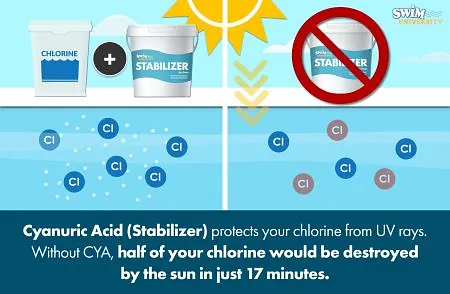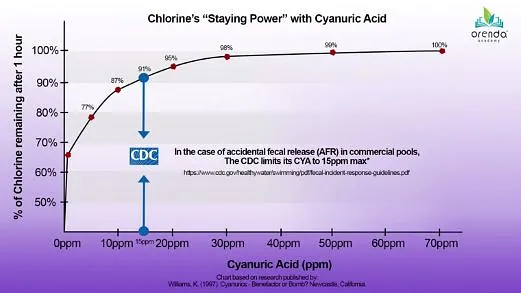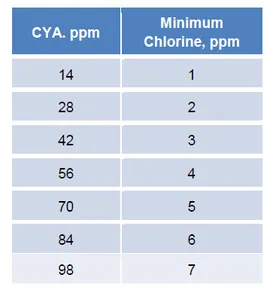Cyanuric Acid - CYA

Cyanuric acid (CYA)
Also known as chlorine stabilizer or pool conditioner, is an essential chemical for maintaining the effectiveness of chlorine in swimming pools, especially those exposed to sunlight.
Here’s a quick overview:
What is Cyanuric Acid?
Cyanuric acid (CYA) is a chemical compound used in swimming pools to stabilize chlorine and protect it from being broken down by the sun’s ultraviolet (UV) rays. It’s often referred to as a chlorine stabilizer or pool conditioner.
Why is it Important?
Without cyanuric acid, the chlorine in your pool can degrade rapidly under UV light, losing up to 90% of its effectiveness in just a few hours. This means you would need to add chlorine more frequently, increasing maintenance efforts and costs.
How Does it Work?
To recap, chlorine in water forms HOCl, which quickly binds to CYA to form chlorinated isocyanurates that are resistant to sunlight degradation. HOCl is released from CYA when a contaminant needs to be killed or oxidized. This is the essence of chlorine stabilization.
Ideal Levels
The ideal cyanuric acid level in a pool is typically between 30 and 50 parts per million (ppm). Too much CYA can reduce chlorine’s effectiveness, while too little can lead to rapid chlorine loss.
Rain can affect cyanuric acid (CYA) levels in swimming pools. Heavy rainfall can dilute the pool water, leading to a decrease in CYA concentration. This is because rainwater, which typically has very low levels of CYA, mixes with the pool water, reducing the overall concentration.
It’s a good idea to test your pool’s CYA levels after significant rainfall and adjust as necessary to maintain the ideal range. This helps ensure your chlorine remains effective in protecting your pool from contaminants.
Maintenance Tips
Testing: Regularly test your pool water to ensure CYA levels are within the recommended range.
Adjustment: If levels are too high, partially drain and refill your pool with fresh water. If too low, add a stabilizer product containing cyanuric acid.
Maintaining the right balance of cyanuric acid is crucial for keeping your pool water clean and safe. Do you have any specific questions about managing your pool’s chemistry?
Chlorine Lock
Too much Stabilizer: A chlorine lock can occur when you have added too much cyanuric acid, or stabilizer, into your pool water. Stabilizer is a chemical intended to protect chlorine from burning off too quickly from UV rays. If you get too much of it, it can completely block your chlorine and make it ineffective. Refer to the following figures:
Cyanuric Acid (CYA) Reduction
The most cost-effective method to reduce CYA is to sufficiently lower the water level and replenish it with fresh water. It's important to note that while there are chemicals capable of reducing CYA, they may be significantly more expensive than the dilution approach.
Chemical Used



